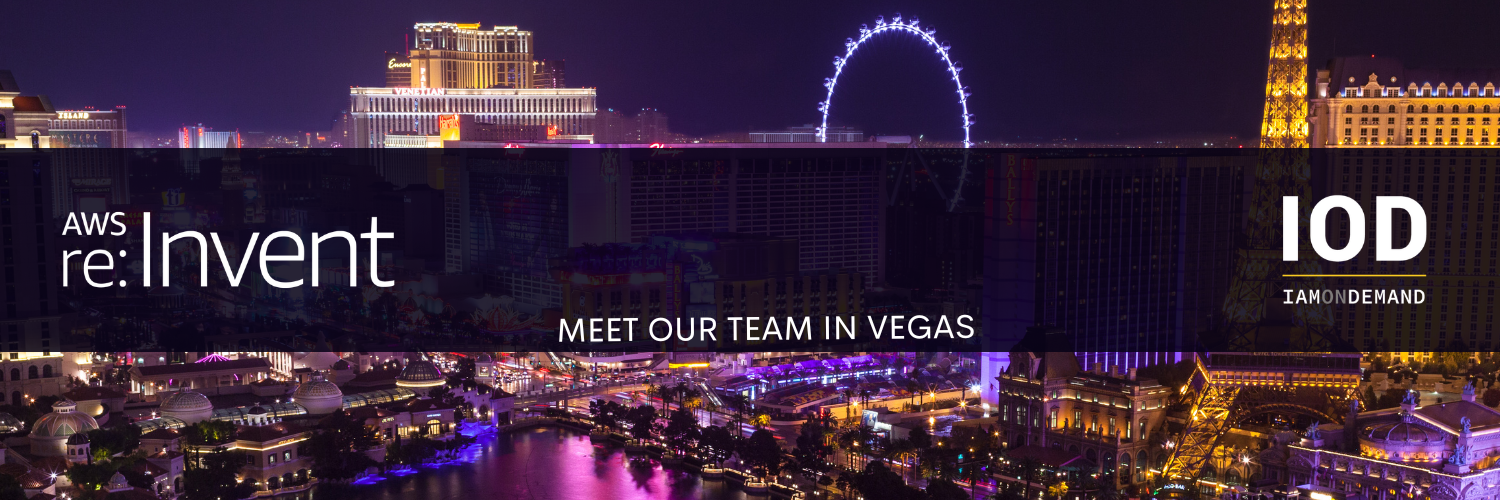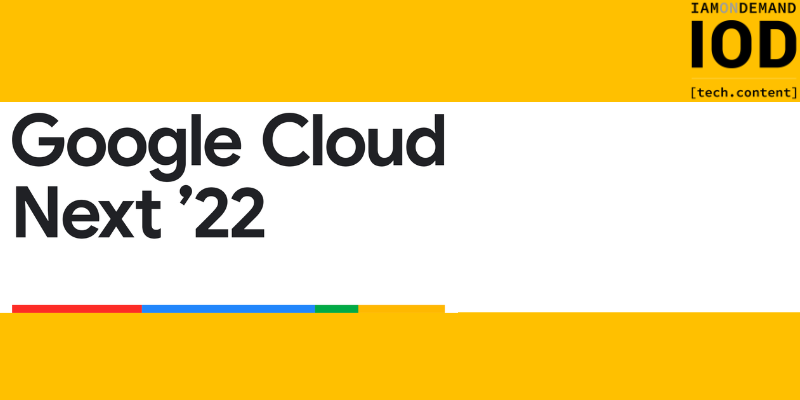This year’s Google Cloud Next Summit—featuring over 220 speakers and 200+ in-person events across 5 global broadcast hubs—revealed exciting changes and additions Google is contributing to the cloud computing industry through their Industry Solutions Portfolio.
In Q2 2022, Google reported a $25B annual revenue run rate, with $6.3B directly attributed to the Google Cloud Platform—a 35% YoY increase. And as most of my followers probably know, Google is the third largest cloud provider behind Microsoft and AWS.
Google’s strength lies in their deep engagement with the developer and open-source world (e.g., Kubernetes and TensorFlow). By appealing to both cutting-edge developers and enterprise business users through Google Workspaces, Google is well positioned to gain a larger foothold in the industry. The company’s progress in translation, computer vision, and natural language processing is helping, and the recently announced platform advancements may help Google keep it position in this still-evolving market.
Google Innovation Champions Collaboration
Google stands out as the most research-oriented technology vendor in the field. That gives them an upper hand on bringing heavily researched and long-term open-source products to market. Right now, their commitment to enabling users across the globe and streamlining collaboration is clear in their latest projects.
For example, Google is bravely leading the way with their Translation Hub. By allowing companies to run translation services at scale with autoML, Google is expanding access to their services and improving the user experience for their worldwide user base. The Translation Hub can translate full documents into 135 different languages—including languages not commonly represented on the internet—while preserving layouts and formatting, making it easy to distribute information to customers and employees worldwide. This is impressive.
They’re also strengthening collaboration through projects like Google Starline—a communication tool introduced in May 2021 that employs computer vision and ML technology to create a 3D model of a person and provide the experience of speaking to them in person. Google is offering early access to this technology through in-office booths for select enterprise partners, including Salesforce, T-Mobile, and WeWork. Considering IOD employees and freelancers use WeWork offices, we’re excited to test this technology soon.
What Makes Google’s Cloud Business Different: An AI-First Perspective
As an AI-first company, Google understands that its roots in AI give them a unique position within the cloud-first industry. This year’s summit illustrated how Google is solidifying their position as an industry leader by taking advantage of the data available to them and differentiating their cloud products to support more use cases.
As Google builds out their Google Cloud Platform (GCP), they’re leveraging their proprietary AI insights to strengthen their public cloud services. This sets them apart from providers like Amazon’s AWS—which uses their retail background to enable buying and selling in a scalable micro-financial environment—or Microsoft’s Azure—which leverages existing long-term enterprise relationships to provide cloud services to IT users who “just need another server.”
For example, Google’s AI can clean factory data across multiple locations and create effective data pipelines to process billions of data sets every day. It can also allow global retail organizations to provide region-specific shopping recommendations and help finance organizations make explainable credit decisions to support anti-money laundering efforts.
Now, Google’s AI technology is becoming even more accessible to users across the globe.
Surprise! Israel Is Google’s Newest Cloud Region
Google Cloud’s infrastructure is expanding, and Tel Aviv is the latest addition to Google’s network of cloud regions.
Expanding Google Cloud in Israel means companies operating in the startup nation gain access to high-performance, low-latency services. The Israeli government has already committed to leveraging Google Cloud for government services, and recent research shows that expanding Google Cloud in Tel Aviv will contribute $7.6B to Israel’s GDP and create 21,200 jobs by 2030.
What’s Next for Google Cloud?
This year’s Google Cloud Next 2022 Summit demonstrated Google’s ongoing commitment to expanding its cloud offerings throughout their Industry Solutions Portfolio. As Google’s open data ecosystem continues to grow, developers can expect to see even more exciting updates and improvements to the Data Cloud, Infrastructure Cloud, Collaboration Cloud, and Trusted Cloud.
What’s next for Google Cloud? We’re not sure, but we’re excited to find out!
Here at IOD, we always stay on the cutting edge of what’s happening in the cloud computing industry to help our clients develop exceptional tech content. We specialize in helping companies write meaningful tech content that strengthens their brands and helps convert traffic into quality leads.
Google Cloud Next ‘22: Announcements
Check out the significant product and feature releases shared at the Google Cloud Next ‘22 Summit and our main takeaways.
Introducing: Google’s Data Cloud
During the summit, Google introduced its new unified and intelligent data and AI solution platform, Data Cloud. Data Cloud is a comprehensive open data ecosystem that combines new Google services with existing services and partner integrations to improve data analytics and storage capabilities.
The newly announced platform includes:
- BigLake: A new storage engine that unifies data warehouses and lakes, giving customers fine-grained access control and improved query performance across multiple clouds and data formats. BigLake currently supports Iceberg and integrates with Dataplex, plus support for Delta Lake and Hudi are coming soon.
- AlloyDB for PostgreSQL: A recently introduced fully managed PostgreSQL database engine offering a faster way to query relational database workloads. Democratized access, VPC service controls, and customer-managed encryption keys have already been introduced, while cross-region replication and point-in-time recovery are coming soon. Plus, with Google’s new Database Migration Service, homogeneous migrations to AlloyDB are faster and easier.
- The Looker Family: A new integrated business intelligence platform that enables Google Workspace and GCP Console Activation with all the capabilities from Looker, Looker Studio & Studio Pro, and Looker API.
- Translation Hub: An AI agent that enables enterprises to rapidly translate documents in 135 languages.
- Vertex AI Vision: An end-to-end environment allowing developers to create, store, and deploy computer vision AI applications.
Google also announced improvements to existing products, like:
- Changes to BigQuery, including a new integrated experience with Spark, datastream integrations, and support for unstructured data. Now, customers can use BigQuery to build SQL-based pipelines with unstructured data and leverage Google IP like speech recognition, vision, translation, and text processing. BigQuery is also more secure with GCP IAM technology, row/column-level security capabilities, and the ability to govern object metadata and inferences across all data.
- Improved data quality and lineage with Dataplex through automatic data quality checks and remediations, information on how data assets are sourced and transformed, enhanced policy management, and data catalog integration.
- Additions to the Document AI platform, including the Document AI Workbench—a tool that allows developers to extract data from documents with custom ML models—and Document AI Warehouse—a fully managed cloud-native service for businesses to search, store, govern, and manage documents and data extracted by Document AI.
- New native Vertex AI integrations that allow developers to apply machine learning models in Cloud Spinner and AlloyDB using familiar SQL.
- Expanded partnerships and integrations, including MongoDB to free up database resources, Collibra to understand data lineage and discover data, Palantir to enable operational analytics use cases, Elastic to build search indexes using Embedded Elasticsearch, and ServiceNow to integrate Flow Designer and App Engine with BigQuery.
Key Takeaways
This new platform demonstrates Google’s commitment to continued velocity and investment in developing the most open, fully integrated, and unified data cloud solution. With Data Cloud, Google is enabling customers to gain exponential value from their business data by combining exceptional flexibility and Google intelligence.
Google’s Optimized Open Infrastructure Cloud
Google’s investment in an Open Source AI Initiative is demonstrated in their newly launched Infrastructure for AI and ML Workloads. It features A2-ultra GPU—offering the largest and fastest GPU memory designed to support complex ML models—and Cloud TPU v4—a less expensive and faster method to manage large-scale training workloads.
The Open Infrastructure Cloud features a dedicated migration center, plus:
– VMware Cloud Universal, a program to create private clouds with 99.99% single site availability SLA in under one hour.
– Workload Manager, a SAP workload manager offering automatic visibility and configuration recommendations.
– Cost Optimization Enhancements through Spot VMs, TCO optimization with Autoclass, flexible committed use discounts
– Dual Run for Mainframes, a program that supports compliance by de-risking mainframe modernization and that provides real-time testing, stability, and backups.
– Software Delivery Shield, a secure software supply chain solution that supports the software development lifecycle by including dependencies and runtimes through automation and policy management.
– Cloud Workstations, cloud-native managed and secure development environments.
– GKE security updates, which extends container security posture awareness across GKE.
– Anthos multi-cloud and hybrid updates for fleet management and virtual machine support, including a new interface for provisioning and upgrading on-premises clusters, updated fleet APIs and dashboards, and an improved experience—including Crossplane integration—for attached clusters.
– Google Cloud Skills Boost + Innovators Plus, a subscription-based learning platform for developers with over 700 hands-on labs and courses.
Key Takeaways
Google’s updated Open Infrastructure Cloud is designed to support key workloads. Through new partnerships and the open-source ecosystem, Google offers an innovative comprehensive solution that helps customers optimize costs, streamline operations, and achieve transformative benefits.
Collaboration Cloud Through Google Workspace
Google announced enhanced Google Workspace capabilities that will help three billion users and eight million customers work more collaboratively. The redesigned Google Workspace makes it possible to:
- Enable immersive connections by prioritizing people-first collaboration across the platform, using features like adaptive framing for Google Meet.
- Collapsing boundaries with flexible tools that help people do their best work, like custom building blocks in smart canvas.
- Extending the power of Google Workspace through a powerful, open, and flexible platform that adapts to relevant business needs, like integrating Figma with Google Meet.
- Safeguarding collaboration through cloud-first threat protection, AI, and global scale capabilities, like data loss prevention features integrated into Google Chat.
Key Takeaways
Google is making cloud-first collaboration more supportive of how people actually work. New features and tools support current and future business needs, making Google Workspace a powerful platform for productivity.
Google’s Strengthened Trusted Cloud
Even sophisticated and persistent cyberattacks are no match for the new collaboration between Google Cloud and cybersecurity leader Mandiant. Through this partnership, Google is providing enhanced cloud security capabilities, including:
- Modern security operations that leverage Google’s speed, scale, and intel to rapidly mitigate and manage security threats. Through Google Cloud’s extensive insights and threat intelligence, companies can make better decisions and more effectively respond to threats. Exceptional sub-second search capabilities and an integrated experience across SIEM & SOAR make it easy to keep track of all your company’s data, no matter where it is.
- Software supply chain security with 250 packages across Java and Python curated by Assured Open Source Software.
Google also announced advancements to their Trusted Cloud platform related to improved cloud governance and digital sovereignty, cloud risk management, online fraud detection, and zero-trust access.
Key Takeaways
By partnering with Mandiant, Google is supporting their new initiatives with cutting-edge, cloud-native security solutions. Leveraging Google’s extensive intel makes their operations capabilities even more reliable. Now, organizations can transition to the cloud with greater confidence that their data is secure.


